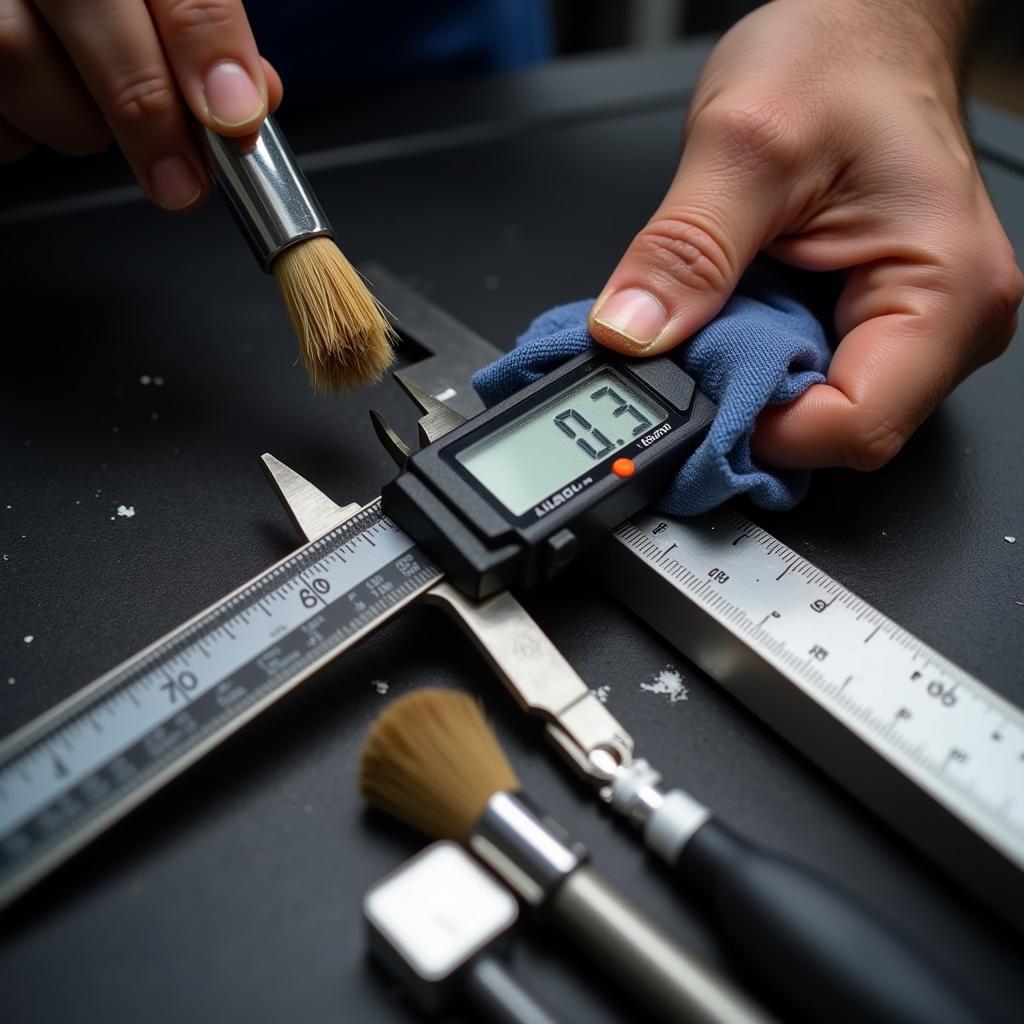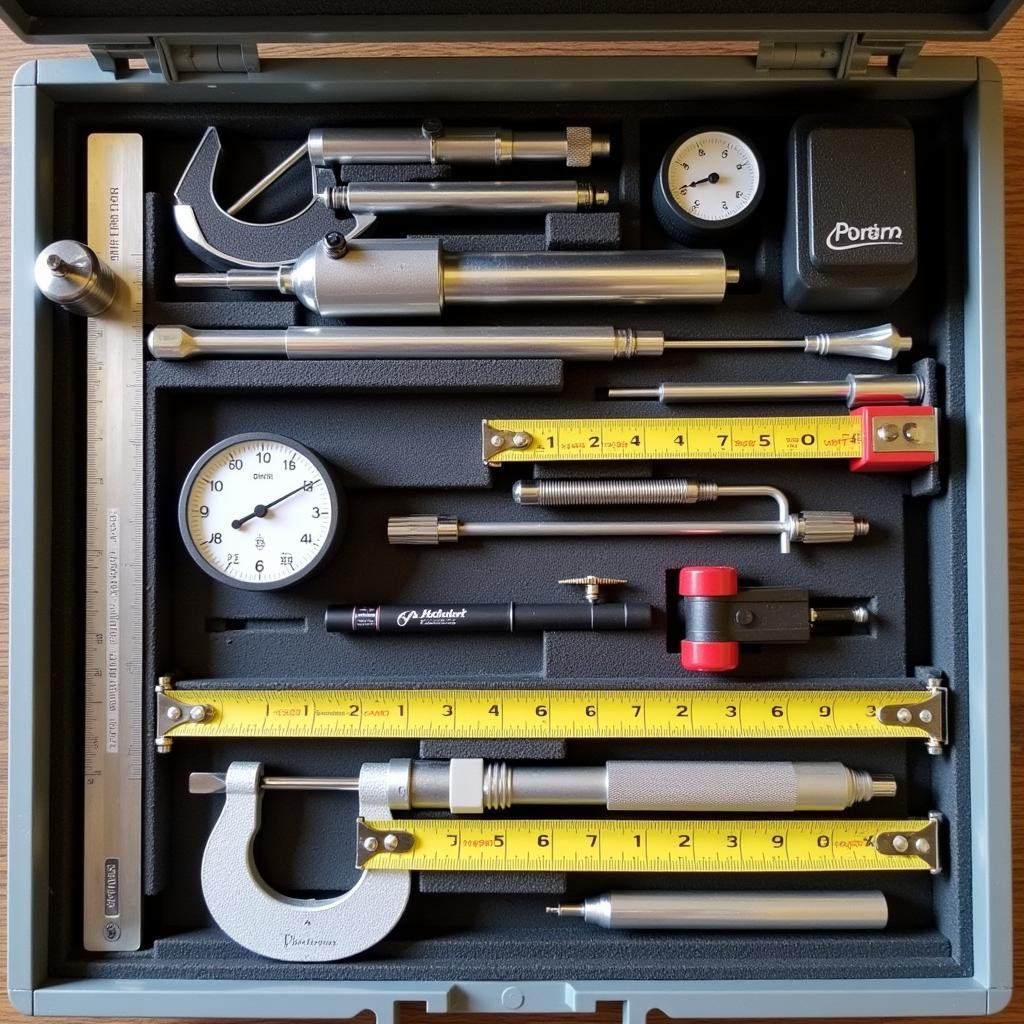Precision measuring tools are essential for accurate diagnostics and repairs in the automotive industry. Proper care and maintenance of these tools ensures reliable readings, extends their lifespan, and ultimately saves you time and money. This guide explores the essential steps involved in describing the care and maintenance of measuring tools.
Why is Measuring Tool Maintenance Important?
Accurate measurements are the foundation of any successful diagnostic or repair job. Neglecting the care of your measuring tools can lead to inaccurate readings, which can result in misdiagnosis, wasted time, and costly repairs. Regular maintenance also helps prevent premature wear and tear, maximizing the lifespan of your valuable tools.
Cleaning Your Measuring Tools
 Cleaning various measuring tools like calipers, micrometers, and rulers
Cleaning various measuring tools like calipers, micrometers, and rulers
Cleaning your measuring tools is the first and most crucial step in their maintenance. Dirt, grime, and metal shavings can interfere with the accurate functioning of your tools. Always consult the manufacturer’s instructions for cleaning recommendations specific to your tool. Generally, use a soft cloth, brush, or compressed air to remove loose debris. For stubborn grime, use a mild cleaning solution and thoroughly dry the tool afterward. Avoid abrasive cleaners or harsh chemicals that can damage the tool’s surface. Remember to lubricate moving parts with a light oil after cleaning.
Proper Storage of Measuring Tools
 Proper storage methods for measuring tools in a toolbox or dedicated storage area.
Proper storage methods for measuring tools in a toolbox or dedicated storage area.
Proper storage prevents damage and maintains the accuracy of your measuring tools. Store your tools in a clean, dry environment away from extreme temperatures and humidity. Use protective cases or dedicated compartments in your toolbox to prevent them from banging against each other. Keep precision tools like micrometers in their original cases to protect them from dust and damage.
Calibration and Verification
Regular calibration ensures your measuring tools remain accurate. The frequency of calibration depends on the tool and its usage. Consult the manufacturer’s guidelines for recommended calibration intervals. You can perform basic checks yourself using known standards, such as gauge blocks or reference standards. For more complex tools, it’s best to send them to a certified calibration laboratory.
Types of Measuring Tools and Their Specific Care
Different measuring tools require specific care and maintenance procedures. Let’s delve into some examples:
Calipers
Clean the caliper jaws and surfaces with a soft cloth and a mild cleaning solution. Lubricate the sliding surfaces and the rack and pinion mechanism with a light oil. Check for any signs of wear or damage, especially to the jaws and the display.
Micrometers
Store micrometers in their protective cases when not in use. Clean the anvil and spindle faces with a soft cloth and a specialized cleaning solution. Avoid excessive force when tightening the thimble. Periodically calibrate the micrometer using gauge blocks.
Dial Indicators
Clean the contact point and the stem of the dial indicator with a soft cloth. Avoid dropping or impacting the indicator, as this can damage the delicate internal mechanisms. Periodically check the indicator for accuracy by comparing it to a known standard.
“Regular maintenance isn’t just about keeping your tools clean; it’s about ensuring the quality and accuracy of your work.” – John Smith, Automotive Engineer at DiagFixPro.
Troubleshooting Common Issues
Sticking or binding parts can often be resolved with cleaning and lubrication. Inaccurate readings might indicate a need for calibration or repair. Always consult the manufacturer’s troubleshooting guide or contact a qualified technician for assistance.
How often should I calibrate my measuring tools?
Calibration frequency depends on the tool and its usage. Consult the manufacturer’s guidelines for specific recommendations.
“Investing in quality measuring tools and maintaining them meticulously is a hallmark of a true professional.” – Jane Doe, Lead Diagnostic Technician at DiagFixPro.
Conclusion
Describe The Care And Maintenance Of Measuring Tools is critical for accurate automotive diagnostics and repairs. By following these guidelines, you can ensure the longevity and precision of your tools, leading to more efficient and reliable work.
FAQ
- What are the basic steps for cleaning measuring tools?
- How should I store my measuring tools to prevent damage?
- How often should I calibrate my measuring tools?
- What are some common issues with measuring tools and how can I troubleshoot them?
- Why is it important to maintain measuring tools regularly?
- What are the specific care instructions for calipers and micrometers?
- Where can I find reliable calibration services for my measuring tools?
Need further assistance? Contact us via WhatsApp: +1(641)206-8880, Email: [email protected] or visit us at 910 Cedar Lane, Chicago, IL 60605, USA. Our 24/7 customer service team is ready to help.

Leave a Reply